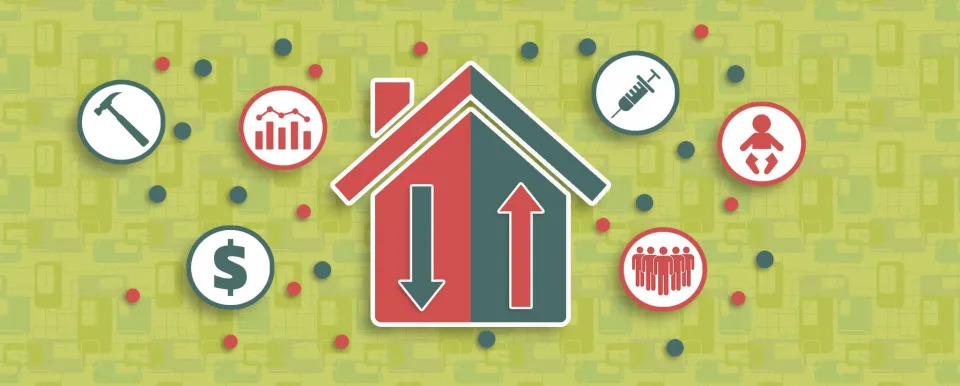What was the most overused word for the U.S. housing market in 2021?
Hot.
How else could you describe a year when the surge in home prices reached 18% year-over-year in October, the highest recorded increase in the 45-year history of CoreLogic’s home price index? And this year is also on track to become the first time that total residential housing transactions exceed $2 trillion, according to CoreLogic.
The pandemic drove intense demand for bigger houses as well-to-do buyers tapped historically low mortgage costs and higher savings rates. But people who hunted for entry-level homes struggled to buy a house as they faced tough competition and multiple competing bids.
Because the Federal Reserve expects to hike interest rates three times next year to slow inflation by making borrowing more expensive, experts believe 2022 will be defined by higher rates, easing inflation and slower increases in home prices.
Compass Real Estate lists a home in Mount Kisco, N.Y., for $2.7 million.
We asked four economists for their top predictions for next year’s housing market:
Abortion, critical race theory could shape housing choice
People will move to places that align with their politics
After the Supreme Court decides contentious cases related to abortion rights and gun rights, we will see more migration for political reasons, says Daryl Fairweather, chief economist with real estate website Redfin. A recent survey by the site confirms that a substantial share of homebuyers won’t move to a place where the laws conflict with their political beliefs. Now that workers have more control over where they live, more people will seek out areas where there are like-minded people with laws that fit their political beliefs. We will also see more blue enclaves grow within red areas and vice versa, as parents select school districts that align with their preferences regarding mask mandates, critical race theory and other controversial issues.
Homebuyers will take climate risks seriously
Now that natural disasters are increasing in frequency and climate risk data is available on websites like Redfin.com, homebuyers are going to come to their agents with questions about climate risk and associated costs, Fairweather says. Homebuyers will want to know about a home or neighborhood’s flood and fire risk and how that impacts their insurance costs or the mortgage rate set by their lender. Homesellers will make climate-resilient investments in order to appeal to climate-conscious homebuyers.
Mortgage rates will rise, translating to $100 more a month for homeowners
I expect 30-year-fixed mortgage rates to rise slowly from around 3% to around 3.6% by the end of 2022, thanks to the pandemic subsiding and lingering inflation, Fairweather forecasts. That would mean about $100 more per month in mortgage payments for the median home. By winter, higher mortgage rates along with already high home prices will likely slow annual price growth down to around 3%, which represents a steep drop from the record 24% increase posted in May 2021. This low price growth will likely discourage speculators from entering the market and allow more first-time buyers to have a chance at winning a home.
Remote work from small towns
Small-town boom
As work-from-home becomes more of a norm, small towns will experience a boom, says Lawrence Yun, chief economist with the National Association of Realtors. The days of coming to the office five days a week are over. Some form of flexibility, whether it is two days, three days, or the first week of each month. We don’t know exactly how everything will play out, but work from home flexibility will be a new, behavioral change, injected into the U.S. lifestyle. And I don’t think people have fully digested what this means. With daily commuting out of the picture, people will seek out affordability and a quieter life. I think the small town, especially the ones near big cities, will be an attractive option.
Extended family vacation homes
We might see an increase in vacation homeownership by an extended family because more family members will now have work-from-home options. For example, a sister uses it in the first week, uncle uses it in the second week. You can buy a home near the ocean and essentially share the cost among the extended family.
Housing wealth
I predict another new record-high net worth in housing equity, even as stock market wealth may be on the downswing. Housing wealth, which is home price minus the mortgage balance, is at a record high this year and it continues to widen next year. A typical homeowner is possibly looking at another $15,000 gain in housing wealth.
(A CoreLogic analysis from earlier this month showed U.S. homeowners with mortgages (roughly 63% of all properties) have seen their equity increase by a total of over $3.2 trillion since the third quarter of 2020, an increase of 31.1% year over year.)
Millennials lift housing market
Millennials enter prime homebuying years
The largest and most educated generational group in history continues to age into their prime homebuying years, driving demand for homeownership, says Odeta Kushi, deputy chief economist with First American Financial Corp. This trend could also see a boost from the continued impacts of the pandemic, which has untethered workers from the office and reduced geographic limitations for many potential home buyers. Yet, they can’t buy what’s not for sale.
The housing supply shortage will persist
Next year, the supply-demand imbalance in the housing market is expected to remain, even as builders are working hard to bridge the gap. The housing market has been underbuilt relative to demand for a decade, and millennials continue to age into their prime homebuying years, so it will take time to reduce the housing-stock deficit.
House price increases may moderate from 2021 highs
Strong demand for homes against limited supply is Econ 101 for house-price appreciation. Mortgage rates are widely expected to rise in 2022 as the economy continues to improve. If double-digit annual house-price growth persists in combination with modest increases in mortgage rates (holding income constant), there will be a negative impact on affordability. This may prompt some buyers to pull back from the market and sellers to adjust their price expectations, which may result in a moderation in house prices. Although we’re likely to remain in a competitive sellers’ market for some time, it’s possible that the affordability crunch and ongoing supply shortage may ease the full-throttle demand we’ve seen in 2021.
Affordability remains a challenge
Homebuyers will see more homes for sale in 2022
After a very competitive year during which inventory evaporated at a rapid pace, real estate markets are expected to see increased supply, says George Ratiu, senior economist with Realtor.com. The site’s 2021 surveys of homeowners indicate a growing share are ready to move forward with pandemic-delayed plans and sell their homes. However, due to the ongoing shortage of new construction, the market will remain competitive for buyers, particularly those looking for homes in entry-level price tiers. The pace of transactions is expected to be brisk, meaning buyers will need to act quickly in order to secure a winning offer. The combination of higher prices, rising inflation and mortgage rates means that buyers will want to recalibrate their budgets before embarking on a home search.
Enter Gen Z homebuyers
There will be 45 million members of Gen Y between the ages of 26 and 35 in 2022, and many of them are in the process of forming families and having children, a stage of life when homeownership can take a central place. After a decade and a half of leading the urban renaissance, millennials are discovering the allure of the suburbs, with greener neighborhoods, larger homes, good public schools and lower real estate prices. With remote work continuing to shape the employment landscape, many homebuyers are stretching the boundaries of commute times in search of affordability and quality of life.
Affordability will remain a central challenge for real estate
While the government response to the COVID-19 pandemic altered the economic and real estate landscape over the past couple of years, it has not improved the preexisting market fundamentals. On the upside, mortgage forbearance and tenant eviction moratoria ensured that Americans remained in their homes during tremendous health challenges. On the downside, the fiscal stimulus programs aimed at building a bridge across an economic recession did not offer sustainable solutions to over a decade of underbuilding.
We head into 2022 with a 5.2 million shortage of new homes, which has pushed prices for both new and existing homes to record highs this year. While homebuilders have ramped up the pace of new construction, they have been facing the headwinds of higher lumber and land prices, as well as a shortage of qualified labor. In addition, after declining sharply in 2020, especially in urban downtowns, rents rebounded in 2021, also reaching new highs. For Americans contending with higher inflation, the rising costs of housing will exacerbate the ongoing affordability concerns next year.
Published by USA Today










